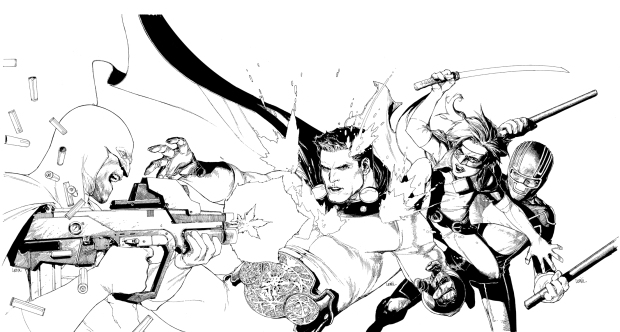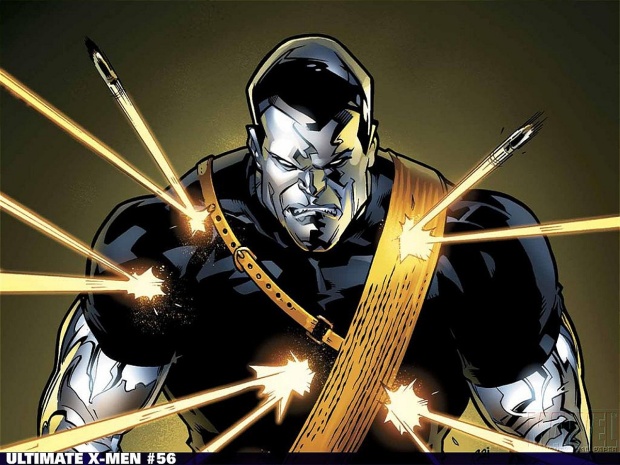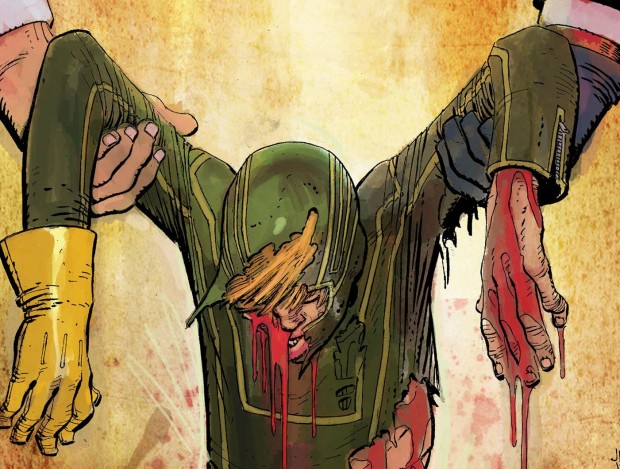 Mark Millar is a media operator, while his peers have a natural talent for recognising the effect of what they do and cross mediums in their choices of content (Morrison in particular can ascribe a lot of his success to his cinematic, literary and popular culture referencing across his comic book work) noone gives you the feeling that they’re not operating on a comic book scale – that the medium is considered too small for the individual involved. Indeed, Millar has expressed a want to break out of the confines of the comic book industry. A belligerent creative child at the heart of commercial companies, it was unlikely that the traditional and watchful Warner Bros (home of Bugs etc) would tolerate such an enfant terrible. Indeed, where novels are a breeding ground of controversial and broad opinions and a fevered battleground of freedom of speech, Millar made clear that comic books at the turn of the century enjoyed no such freedoms.
Mark Millar is a media operator, while his peers have a natural talent for recognising the effect of what they do and cross mediums in their choices of content (Morrison in particular can ascribe a lot of his success to his cinematic, literary and popular culture referencing across his comic book work) noone gives you the feeling that they’re not operating on a comic book scale – that the medium is considered too small for the individual involved. Indeed, Millar has expressed a want to break out of the confines of the comic book industry. A belligerent creative child at the heart of commercial companies, it was unlikely that the traditional and watchful Warner Bros (home of Bugs etc) would tolerate such an enfant terrible. Indeed, where novels are a breeding ground of controversial and broad opinions and a fevered battleground of freedom of speech, Millar made clear that comic books at the turn of the century enjoyed no such freedoms.
Detailed in the last part on Tuesday, there were offered a couple of examples of Millar’s run on the aggressive and controversial Authority title for Wildstorm (an imprint of DC, a subsidiary of Warner Bros). At this stage, with Millar’s Authority pouring in money from buoyant sales DC balked at the destruction of cities and high death tolls in the aftermath of 9/11. With ferocious fan interest and critical acclaim Millar’s Authority suffered an unexpected at the height of its popularity, internal editorialism. DC misjudged the mood of America. While there was shock and anger from the events in New York, networked globally, the general American was facing new realities that European, Asian, African and Middle Eastern nations had long been aware of – that their borders were no longer safe. The war machine beginning to roll into slow motion under the Bush administration, looking for targets belayed a more mature attitude in readerships in the US. A renewed awareness of their vulnerability to powers greater (or more insidious) than their own. A culture of wry and interested fatalism and assured realism was born in the wreckage of 9/11 among certain sections of American society – particularly in the more informed and connected East and West coast and in comic readership. Embryonic at the time – it is now perhaps more visible in the lack of interest in Marvel’s attempts at introducing a new Golden Age of Heroes. Finally, that period in comic books has passed and Millar represented it far better than most with his aggressive, edgy and deliberately sardonic style. DC didn’t agree and Millar began to bite at the chains that bound him, eventually swapping, following some well paid projects for Marvel, to the New York entertainment giant in 2001 to create the Ultimate Universe.
The Ultimate line was an imprint of Marvel comics introducing the Marvel Universe if it was formed today. What was created was a much more hardbitten and edgy number of heroes engaged in political, military, social and personal strife – though the imprint of Stan Lee’s original concepts of character fuelled titles was perhaps put at the bottom of the list of priorities – this was more a love letter to the movie industry and may well have instigated the wholesale redevelopment of major Marvel characters; Thor, Iron Man, Captain America and the Avengers to the big screen.
To begin it was Marvel’s most commercially successful title; the X-Men that was renovated to Ultimate status. The characters now more belligerent, obstinate and teenage than Lee’s incarnations, Millar imbued them with the all-knowing arrogance of teenage Mutants. A total reboot, X-Men was the first title to begin to represent its predecessor as the title inevitably followed the numerous characters plot to the most obvious conclusion; a coherent team of mutants trying to battle the world. While recreating many of the scenarios and plots from the original series; Weapon X, the Nuclear Plant detonation from Issue 1; Millar struggled (perhaps unsurprisingly) to supersede the mainstream series, most likely because it had been the home of some of the foremost artists and writers of the previous quarter century and Marvel’s most innovative title. It was fun though, bitter and harsh at times but with a self conscious teenage cool and a moral ambiguity in the leaderships of both the X-team and the Brotherhood of Mutants (sensibly without the somewhat detrimental ‘Evil’ in the title). The title proved popular and Millar moved to expand the Universe with his incarnation of the less developed Avengers. This was to be his best move.
While all this was taking place; an independent book written by Millar and drawn by J.G. Jones was in preparation. Wanted was released in 2003-2004 and tore a hole a mile wide across conservative comics, kicking them and DC firmly into touch. The lack of belief DC had shown in its readership was proven by the success of this book; featuring a world only populated by Villains – the heroes wiped out some years previously. Opening with bisexual orgies, graphic assassinations and cheating girlfriends the protagonist secretly hates; the patented anger brewed up with the previous years of censorship came spewing out. Featuring characters like Shit-head (formed from the fecal matter of the most evil people in the history of man), Mr Rictus (a skull faced sadist) and Fuckwit (a superhero clone with Downs Syndrome), the protagonist Wesley Gibson electrocutes and rapes celebrities, kills hundreds while ingratiating himself with the Fraternity of Super-villains. It went astronomical, a readership hungry for a challenge snapping it off the shelves as quickly as possible. The intention of Millar was to create a wry and morally and ethically void space in which to populate his darkest writing to date. Ferocious, unforgiving and incredibly unapologetic Millar is every parent’s worst nightmare and every kid’s dream writer. Any book that ends with a full page spread with the central character’s top half leaning in aggressively and shouting ‘This is me fucking you in the ass!’ is to be reckoned with.
Millar is troubling for that reason – his bouts of self control working for commercial giants are interspersed with pure filth and its hard to tell who he is. The knowledge he goes to church every Sunday only deepens the confusion as he represents so little of what is good or ethical about comic books. He represents shameless populism and crowd pleasing. His thinking far deeper than content, Millar has proven, having now been given a stage big enough, that he will stop at nothing to crowd please. Although a great and powerful writer, he lacks the sensitivity and at times subtlety of peers like Morrison and Moore but will stoop as low as the public needs to. His books are the equivalent of throwing the christians to the Lions at the colliseum and feel at times like the breakdown of the medium at the same time as being the bleeding edge and the expansion of it.
His take on the Avengers, the Ultimates, represents the epitomy of modern, advanced and knowledgable writing that transcends the format of comic books and expands its reach. Where the Avengers title – holding tight throughout the nineties and naughties to its showcasing of Marvel’s most heroic and impressive characters – was losing steam, the Ultimates upped the ante and caught the popular edge of the characters within the title. What ensued is a high concept, high octane, gripping and effecting story of disparate heroes representing many fields, Military, special ops, science, media, big business, liberal politics and mainstream politics trying to get on. Brilliantly, Ultimates shows that the characters that have cooperated so effectively in their time in Avengers would create such strain amongst themselves that they represent a larger liability than the threats they pose. Effectively the tale of a political / military complex trying to justify its own existence it spends most of its time fighting off threats within its own ranks. However the set pieces, rendered beautifully by Bryan Hitch – in which the team occasionally rally to combat real threats to the world are truly monumental. There is some poignant character writing within too, most notably involving the emotionally crippled Bruce Banner and the man-out-of-time Steve Rogers.
After 33 issues, Millar left Ultimate X-Men and wrote the number one hit title Marvel Knights Spider-Man in 2004, He also co-wrote the first six issues of Ultimate Fantastic Four with Brian Michael Bendis. He later returned to that title for a 12-issue run throughout 2005-2006, and created the Marvel Zombies spin-off title in his first and final storylines.
But it is his Millarworld movements that interest us here at Beyond the Bunker as Millar is using his considerable weight to focus the comic book industry back towards Britain. Writing Kick-Ass, while in parallel, British film makers Matthew Vaughn and Jane Goldman made a motion picture version secured the success of both by shoring up the other. Both were british made (though Kick-ass was published as a Marvel Imprint) and have kick started a smaller, more quiet UK invasion back from the US. From the success of this Millar launched Clint, in association with Jonathan Ross and Frankie Boyle (both oddly British comedians), an anthology title in the style of 2000AD. Largely hyper-violent and named deliberately to look like the worst kind of swear word from across the room it can’t be accused of being high brow but it does appear to be working. There is no doubt that Millar’s efforts are reinvigorating the UK comic industry and whether this is sustainable is up to him and us frankly. While his motives are unclear and open to great speculation in the halls of comic conventions in the UK – he has reopened a door thought closed by being the most highly valued writer of the last ten years. His writing has excited, enthralled and challenged a very wide generation and expanded the interest in comic books to the wider population (though unfortunately not to 90s levels) but why are we putting all this on one man? Perhaps because he has proven he can handle it and come back with more. Millar might be the revolution we’ve been looking for and like all revolutions you have to applaud its effect if it moves things forwards and not linger too long on the man forcing it forwards and his motives except to applaud that he has and achieved something something special for himself and potentially for the entire UK comics industry. You can’t be bothered by Iconoclasts if you’re not an icon and within this industry that Millar is absolutely an icon for the 21st Century.






